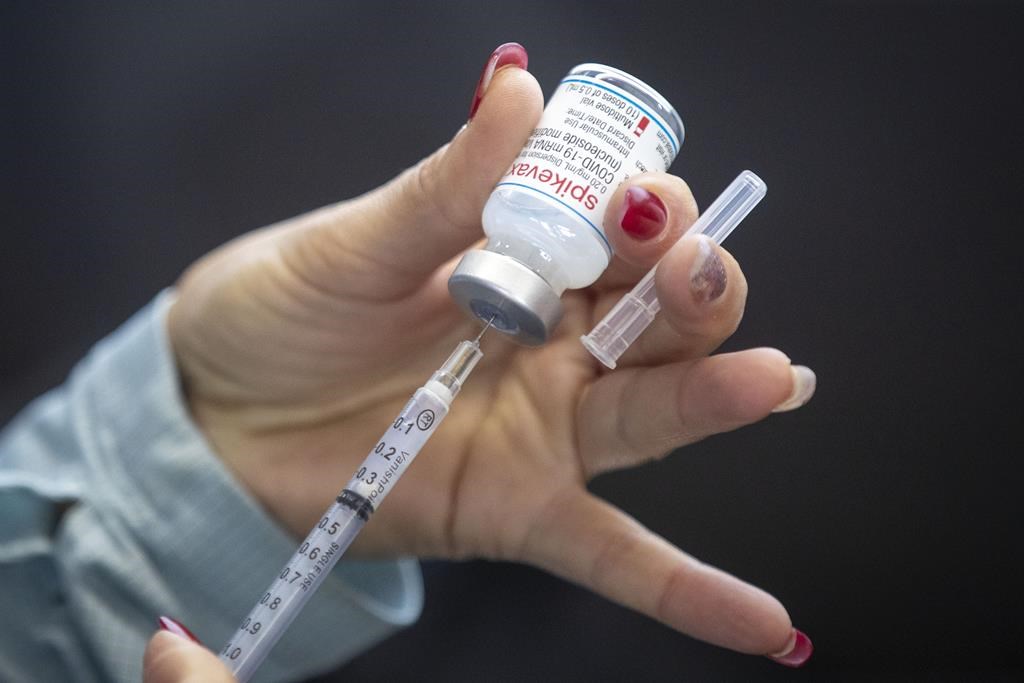Quebec COVID-19 October vaccination campaign: What you need to know

Posted September 26, 2023 12:09 pm.
Last Updated September 26, 2023 6:50 pm.
A COVD-19 vaccination campaign is set to begin in Quebec on October 10 – as cases continue to rise in the province. We discussed this with Dr. Christopher Labos.
1. Tell us about this new vaccine that will be distributed in October – it now targets the current Omicron subvariants?
This vaccine that’s going to be rolled out is going to be different from the vaccines that came before in that it’s a single vaccine directed against a single Omnicron subvariant. It’s directed against the XBB.1.5 subvariant. Now, that’s not the only Omicron subvariant that is circulating right now. A few others are around. But these are all similar enough that the preliminary data that we have shows that this vaccine is going to offer good coverage against all of them. So there’s good reason to believe that this vaccine is going to offer you good protection against what is currently circulating out there right now. The strategy that’s being used is not dissimilar from the strategy that’s used against the flu every year, which is you make a different vaccine every year to try to best match the vaccine to what’s actually circulating out there in the community.
RELATED
Quebec’s vaccination campaign to begin October 10
Health Canada approves updated Moderna vaccine targeting Omicron subvariant
‘More transmissible’ COVID variant – EG.5 – circulating in Canada
2. What do we know about these variants. Are they more contagious? Is that why we are seeing more cases?
There is some evidence that they are more contagious. They are similar enough to the Omicron subvariants that came before that they are not drastically different. They are not, drastically upsetting the apple cart in the same way that Omicron did when it evolved, because Omicron was very different from the Delta variant, which is why things really shot up at a time. They are slightly more infectious. That’s why we’re seeing part of an uptick. Part of it is also the fact that schools are back, the weather’s getting colder, people are spending more time indoors. So it’s a confluence of factors. Part of it, too, is waning immunity. If you got your last vaccine a year ago or had a prior infection at some point in 2022, you likely don’t have any protection from that past event so waning immunity is also contributing to the fact that cases are on the rise.
3. What’s your recommendation on who should get this booster?
The short answer to your question is everyone who’s eligible. The slightly more nuanced question is complicated because there is no ‘yes or no’, it’s not ‘at risk or safe’. Risk exists on a spectrum, so the older you are, the more medical problems you have, the more vulnerable people you have in your life, the higher risk you’re going to be. Also, the type of job that you have, certain situations just put people at higher risk. If you’re a health care worker, you’re at higher risk. If you’re pregnant, you’re at higher risk. There’s a lot of factors that go into it. The point that I like to make to people is that it’s not just about mortality. A lot of people say ‘I’m young and healthy. I’m not going to die’. That’s probably true, but you probably don’t want to get sick. You are less likely to be infected if you’re vaccinated. That is true, despite what many people say on the Internet. You’re probably less likely to have long COVID symptoms if you get vaccinated. Trust me, you do not want the symptoms of long COVID, and you’re less likely to have complications. It’s about reducing the burden of disease. You think you might be okay and you probably will, but you probably are not going to enjoy spending 15 hours waiting at the emergency room to be seen. In a health care system that is stretched as it is, we should probably be doing everything we can to limit the burden of disease and not putting extra strain on a system that may not be able to cope with it.








